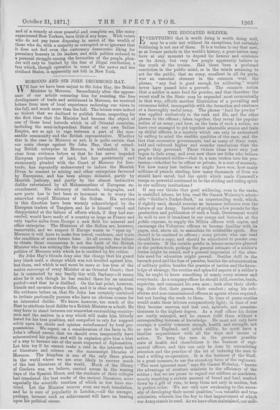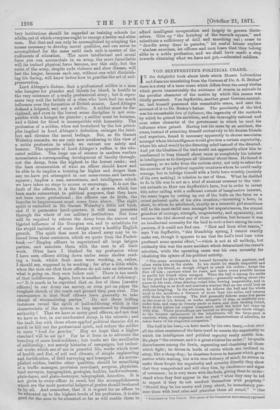THE EDUCATED SOLDIER.
VERYTIIING that is worth doing is worth doing well, may be a rule not without its exceptions, but certainly Soldiering is not one of them. It is a truism to say that now, as at former periods in the world's history, a great nation may have at any moment to depend for honour and existence on its Army, but very few people apparently believe in the truth of the truism. Had there been a profound conviction in the public mind, or in the minds assuming to act for the public, that an army, excellent in all its parts, was an essential element in the common weal, the phrase, " any fool is good enough for soldiering," would never have passed into a proverb. The common notion that a soldier is mere food for powder, and that therefore the worst stuff in the State may be expended most economically
in that way, affords another illustration of a prevailing and erroneous belief, incompatible with the formation and existence of a thoroughly useful army. The phrase "food for powder" was applied exclusively to the rank and file, and the other phrase to the officers ; taken together, they reveal the popular notion of an army ; and how, on the basis of such a notion, we have over managed to get together admirable armies and train up skilful officers, is a mystery which can only be understood by calling to mind the warlike qualities of the race, and the fact that successive governments, bad as many of them were, held and enforced higher and sounder conclusions than the people they governed. These vicious ideas have only just begun to fade away, and even now there are folks who believe that an educated soldier—that is, a man broken into his pro- fession—whether he be officer or private, is a sort of anomaly. Yet how many lost battles we might have won, how many millions of pounds sterling, how many thousands of lives we should have saved, had the spirit which made Cromwell's troops so powerful continued to be the abiding and ruling spirit in our military institutions ?
If any one thinks that good soldiering, even in the ranks, is unskilled labour, let him read Sir Garnet Wolseley's admir-. able " Soldier's Pocket-Book," an unpretending work, which, if rightly used, should exercise an immense influence over the future of our Army. Instead of grudging a few pounds for the production and publication of such a book, Government would do well to sow it broadcast in our camps and barracks at the public expense, to supply the Militia officers with copies, and encourage the Volunteer officers to become familiar with its pages, and, above all, to assimilate its soldierlike spirit. Nor should it be confined to officers ; every private who can read should have a copy, and should be stimulated to ponder over its contents. If the outside public in leisure moments glanced at the pocket-book, perhaps the general estimate of a soldier's duties might be raised, and a general impression of the abso- lute need for education might prevail. Besides drill in the barrack-yard and the fuss of parades, besides the administration of military pollee, besides the practice of tactics and the know- ledge of strategy, the routine and splendid aspects of a soldier's life, he ought to know something of nearly every science and every trade. As a company officer he should drill, exercise, teach, supervise, and command his own men ; look after their cloth- ing, their diet, their games, their conduct ; using his sub- alterns and non-commissioned officers as agents where required, but not leaving the work to them, In time of peace routine would make these labours comparatively light ; in time of war they become onerous, and test zeal, aptitude, and conscien- tiousness to the highest degree. As a staff officer his duties are vastly enlarged, and ho cannot fulfil them without a corresponding increase of knowledge. He must not only have courage, a quality common enough, health and strength, not so rare in England, and quick ability, he must have a familiar acquaintance with all the ways and moans of action. To keep the men in the greatest possible state of health and cheerfulness is the business of regi- mental officers, and this can only be done by unremitting attention and the practice of the art of inducing the men to lend a willing co-operation. It is the business of the Staff, in a great measure, to use the stored-up force of the regiment. " The most ignorant man," says Sir Garnet Wolseley, knows the advantage of creature comforts to the efficiency of the soldier ; but we are prone to regard our soldiers as machines, merely requiring a certain amount of bread and beef, washed down by a gill of rum, to keep them not only in motion, but in perfect order. We are only now awakening to the neces- sity of developing their moral qualities,"—a valuable and true admission, wherein lies the key to that improvement of which our Army stands in need. As we have often maintained, our mill- tary institutions should be regarded as training schools for adults, out of which everyone ought to emerge a better and abler man. But that end. can only be accomplished by adopting the means necessary to develop moral qualities, and can never be accomplished for the mass until each unit is master of the rudiments of education. The more intellectual and moral force you can accumulate in an army, the more formidable will its trained physical force become, nor this only, but the units of the army, despite rude violence and slow disease, will last the longer, because each one, without one whit diminish- ing his daring, will know bettor how to practise the art of self- preservation. Lord Abinger's dictum, that a professional soldier is a man who hungers for plunder and thirsts for blood, is hostile to the very existence of a really professional army ; but it repre- sents very well the beliefs of a class who have had too much influence over the formation of British armies. Lord Abinger defined a brigand, and not a soldier. A soldier must be dis- ciplined, and even in the lowest sense discipline is not com- patible with a hunger for plunder ; a soldier must be humane, and a thirst for blood is incompatible with humanity. The profession of a soldier, when not brutalized by the low princi- ples implied in Lord Abinger's definition, enlarges the intel- lect and elevates the moral feelings. But, as Sir Garnet Wolseley remarks, we are only now awakening to this view of a noble profession to which we entrust our safety and honour. The opposite of Lord Abinger's ruffian is the edu- cated soldier. The large use of science in modern warfare necessitates a corresponding development of faculty through- out the Army, from the highest to the lowest ranks ; and the bare enumeration of what an officer should know and be able to do implies a training far higher and deeper than any we have yet attempted in our mess-rooms and barrack- squares ; implies a zeal, earnestness, and intelligence which we have taken no steps to arouse or encourage. It is not the fault of the officers, it is the fault of a system which has been made subservient to political purposes, that they have not been more professional ; the officers can do little, the impulse to improvement must come from above. The right spirit is embodied in Sir Garnet Wolseley's little red book, and if it permeates head-quarters, it will soon percolate through the whole of our military institutions. But time will be required to release the Army from the narrow and bigoted influence of the Georgian era, and to substitute for the stupid imitation of some foreign army a healthy English growth. The spirit that must be chased away may be in- ferred from these sentences, which we quote from the Pocket- book :—" Employ officers to superintend all large fatigue parties, and associate them with the men in all their work. Often have I blushed for my profession when I have seen officers sitting down under some shelter read- ing a book, whilst their men were working, or, rather, I should say, supposed to be working ; for after a little while, when the men see that their officers do not take an interest in what is going on, they soon follow suit." There is too much of that indifference. Again, here is another sort of deficiency : —" It is much to be regretted that so few of them [cavalry officers] in our Army can survey, or even put on paper the roughest sketch of the roads and ground they pass over. The consequence is that Staff officers have generally to take charge of reconnoitring parties." Do not these trifling instances reveal the spirit of half-soldiering which is the characteristic of the system so long sanctioned by dominant authority ? That we have so many good officers, and not that we have so few, in our uneducated Army, is the miracle ; and the fault lies with those whose applied political theories did so much to kill out the professional spirit, and reduce the soldier to mere "food for powder." May we hope that a higher standard will be set up ? Far be it from us to advocate the breeding of mere book-soldiers ; but books are the auxiliaries of soldiership ; not merely histories of campaigns, but techni- cal works which are of use in peaceful life, works which treat of health and diet, of soil and climate, of simple engineering and fortification, of field surveying and transport. An accom- plished soldier, besides other qualities, should be something of a traffic manager, provision merchant, surgeon, physician, land surveyor, topographist, geologist, builder, backwoodsman, plate-layer, and plate-destroyer, telegraphist, detective. It is not given to every officer to excel, but the accomplishments which are the most powerful helpers of genius should be shared in by all. And remember, that if it is good for an officer to be educated up to the highest levels of his profession, it is also good for the men to be educated so far as will enable them to afford intelligent co-operation and largely to govern them- selves. Give up "the humbug of the barrack square," and substitute a sufficiency of drill and marching out ; cease •to " dawdle away time in parades," let useful labour replace " aimless exercises, let officers and men learn that they belong alike to a noble profession, and we shall have made a step towards obtaining what we have not got,—educated soldiers.



































 Previous page
Previous page